PRINCETON, NJ -- The majority of Americans rate the quality of healthcare in the U.S. as excellent (20%) or good (39%), as they have consistently done over the past decade. However, relatively few give excellent (6%) or good (27%) ratings to U.S. healthcare coverage. Positive views about healthcare coverage have declined this year after increasing in 2009 and maintaining that level in 2010 -- during the heated discussion and then passage of President Barack Obama's healthcare reform initiative.
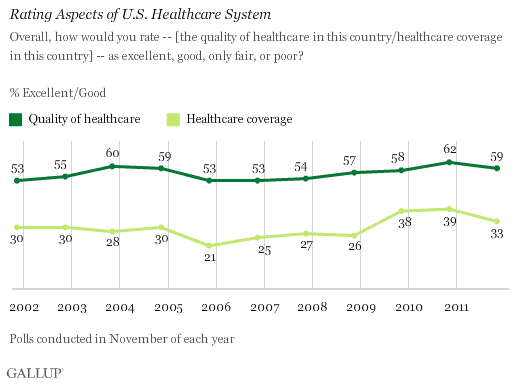
These results are based on Gallup's Health and Healthcare survey, conducted each November since 2001. The 2011 update was conducted Nov. 3-6.
Republicans and independents became more negative about U.S. healthcare coverage this year. Republicans had grown increasingly positive in 2009 and 2010, but the current 47% "excellent/good" rating they give to U.S. healthcare coverage is almost back to the level found in 2008. The percentage of Republicans rating healthcare coverage as excellent or good rose from 43% in November 2008 to 55% in November 2009. This may have reflected Republicans' increased support for the status quo, given their widespread opposition to Obama's healthcare proposals.
Independents had also become much more positive about U.S. healthcare coverage in 2009, but their current 29% "excellent/good" rating is identical to what it was in 2008.
Democrats' ratings of U.S. healthcare coverage improved in 2009 and have remained elevated since. Still, Democrats remain significantly less satisfied than Republicans with healthcare coverage in the U.S.
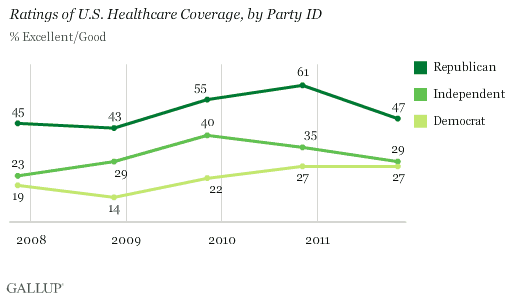
No Improvement in Satisfaction With Healthcare Costs
Americans' views about the total cost of healthcare in the U.S. are roughly the same as last year, with around 20% satisfied and more than three-quarters dissatisfied (currently 78%). However, satisfaction with costs is down from November 2009, when it reached 26%.
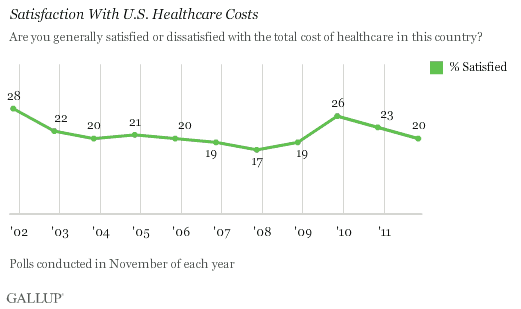
Majority Still Says Healthcare System Has Major Problems
Americans continue to view the U.S. healthcare system quite negatively, with the majority saying it has major problems. Another 16% go further and say it is in a state of crisis, resulting in 73% seeing the need for major reforms. The percentage saying the system is in crisis peaked at 21% in 2009 amid debate over Obama's healthcare plan but has since subsided to 16%, similar to where it stood prior to his election.
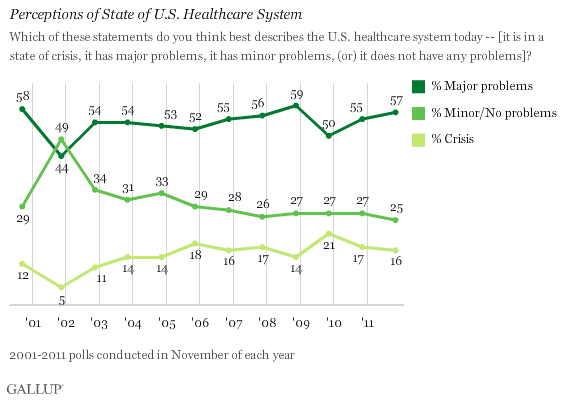
Americans continue to name access to healthcare and healthcare costs as the most urgent health problems facing the country, as they have done since 2003. Obesity and cancer rank third and fourth in 2011, positions they have shared since 2004, except for two years -- 2009 and 2005 -- when flu was of particularly high concern. The percentage mentioning government interference rose in 2010 but subsided this year. (See the PDF link at the end for full trends.)
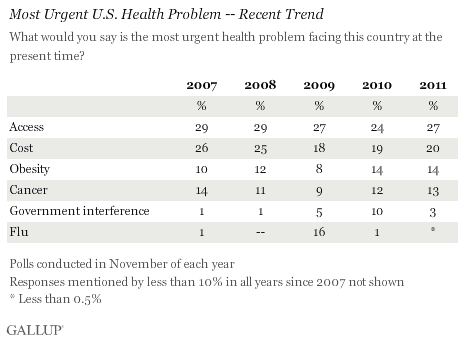
Bottom Line
Despite passage of President Obama's healthcare reform initiative in March 2010, Americans are barely more content today with the nation's healthcare system than they were before his presidency. While the majority continue to be upbeat about the quality of U.S. healthcare, most give coverage subpar ratings, are dissatisfied with costs, and still see the need for major reforms.
The political debate leading up to passage of healthcare reform may have temporarily caused Republicans and independents to adopt a more positive stance toward healthcare coverage in the country. But those views have largely reverted to where they stood before Obama took office. At the same time, Democrats' views on coverage have improved slightly, likely reflecting their support for changes made under the new law.
In essence, Obama's healthcare law has thus far failed to convince Americans the system is fixed. While the policies go too far in the direction of government-run healthcare for most Republicans, who want to repeal the law, most Democrats may want to see government-sponsored coverage go further.
Survey Methods
Results for this Gallup poll are based on telephone interviews conducted Nov. 3-6, 2011, with a random sample of 1,012 adults, aged 18 and older, living in all 50 U.S. states and the District of Columbia.
For results based on the total sample of national adults, one can say with 95% confidence that the maximum margin of sampling error is ±4 percentage points.
Interviews are conducted with respondents on landline telephones and cellular phones, with interviews conducted in Spanish for respondents who are primarily Spanish-speaking. Each sample includes a minimum quota of 400 cell phone respondents and 600 landline respondents per 1,000 national adults, with additional minimum quotas among landline respondents by region. Landline telephone numbers are chosen at random among listed telephone numbers. Cell phone numbers are selected using random-digit-dial methods. Landline respondents are chosen at random within each household on the basis of which member had the most recent birthday.
Samples are weighted by gender, age, race, Hispanic ethnicity, education, region, adults in the household, and phone status (cell phone only/landline only/both, cell phone mostly, and having an unlisted landline number). Demographic weighting targets are based on the March 2010 Current Population Survey figures for the aged 18 and older non-institutionalized population living in U.S. telephone households. All reported margins of sampling error include the computed design effects for weighting and sample design.
In addition to sampling error, question wording and practical difficulties in conducting surveys can introduce error or bias into the findings of public opinion polls.
View methodology, full question results, and trend data.
For more details on Gallup's polling methodology, visit www.gallup.com.
